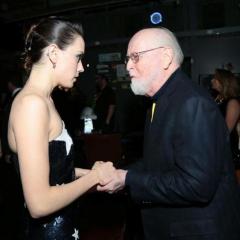-
Posts
964 -
Joined
-
Last visited
-
Days Won
1
Posts posted by Score
-
-
12 hours ago, Bespin said:
Like three movements of "Catch Me if YOu CAn" became a Concerto named "Escapades, concerto for alto saxophone & orchestra", which every wind player around the world already recorded.
In the case of Escapades, the reworking is substantial. The first movement is nearly identical to the Main Titles, ok, but the second and third movements are significantly different from their counterparts in the film score.
-
2 hours ago, Fabulin said:
Because of the diversity of such items across Williams' career, a good starting question would be whether a coherent solution for all arrangements after film scores is possible, and whether it is even needed.
I would be inclined to include suites such as that from The Force Awakens within one number with the score proper if Williams created them immediately after scoring the film.
Concert pieces and arrangements created years later (Star Gazers, the new Han Solo and the Princess) should in my view get an independent number, even if they are very close to the source material.
If you agree, feel free to add such pieces accordingly to the index

I think the most coherent way would be to give suites the same number as the corresponding film score, plus a letter. For example, if the film score to TFA has catalogue number 206, then the Suite would be 206a and the Adagio would be 206b (independently of the year of composition). Composers who gave opus number to their works were not always coherent about this issue. For example, Prokofiev gave op. 64 to the ballet "Romeo and Juliet", then he gave opus numbers 64bis, 64ter and 101 to the three orchestral suites extracted (and re-arranged) from it!
Also, consider that basically all the concert suites were at least a bit re-orchestrated, so I would not count any of them as part of the respective film scores. For example, the Main Title of Star Wars, as given in the concert suite, has a different orchestration from the cue recorded for the film score.
-
- Popular Post
- Popular Post
-
Fantastic news. I only wish he had started to do these things earlier...
-
3 minutes ago, Jurassic Shark said:
I seriously don't know what you're talking about.
Unfortunately, I do. My suggestion is, just enjoy Gabriel's Oboe in its original form (if you like it) and do not investigate further

-
56 minutes ago, Biodome said:
Note that this is only true for Morricone, where {Morricone∈ℝ∣Morricone≠0}
Not exactly; it is enough to assume that Morricone is not zero (but this is obviously true!), but he does need to be real (he can be complex - and indeed, some of his music is really complex).
-
I know, it was a pleasure to share with you this major breakthrough in musicology!
-
- Popular Post
- Popular Post
Well, instead of comparing Williams to Bach, I would compare him to Tchaikovsky. However,
Tchaikovsky : Brahms = Williams : Morricone
and therefore,
Tchaikovsky = Williams x Brahms / Morricone .
So, we cannot really say that Tchaikovsky was the John Williams of his time. I would rather say, Tchaikovsky was the John Williams times Brahms divided by Morricone, of his time. I hope this makes sense.
-
8 hours ago, Thor said:
Hm. I'd love to read that.
It was the interview with Alex Ross:
https://www.newyorker.com/culture/persons-of-interest/the-force-is-still-strong-with-john-williams
also quoted here at the Legacy of John Williams:
https://thelegacyofjohnwilliams.com/2020/09/07/john-williams-in-vienna/
-
22 hours ago, BB-8 said:
So maybe John Williams is now the same size as Brahms or even bigger?
https://slippedisc.com/2020/01/bigger-than-brahms-john-williams-in-vienna/
Personally, I never had any doubt about that!
-
18 hours ago, Albus Percival Wulfric said:
Definitely a deserved honor and an awesome company, which also includes Brahms, who got the medal in 1877!
-
Great news! Judging by the inventiveness of the percussion parts in pieces such as "Happy Birthday Variations", I have high expectations on this!
-
7 minutes ago, Jurassic Shark said:
I'm talking about JW being aware of the need to vary the key throughtout the score for his long scores.
Ok, then this is surely consistent with what he does, e.g., in the SW scores. In this sense, I think it is correct to state that most of JW's scores have no single tonal center, because he continuously change keys.
-
1 hour ago, Jurassic Shark said:
I remember that JW said in a interview that key relationships throughout the score is something he keeps in mind for longer scores like Star Wars. I don't remember which interview it was, @Falstaft probably does.
I am not sure that it was about "key relationships", perhaps it was about "stylistic relationships"?
As an example, in the score of Star Wars you have the main theme sounding in Bb major in the main title, then the next cue that has the tonal center on Bb is "Here They Come" (if we exclude the very ending of "Destruction of Alderaan" and the very ending of "The Death Star"), then there is a brief statement of the main theme in Bb during the final battle cue. And, unless I'm forgetting something, that's about it for Bb, so I would not call that a tonal center for the whole score, and I cannot think of another one. The other instances of the main theme occur in keys such as D flat major, E flat major, D major, G major. The Force theme occurs in keys as diverse as G minor, C# minor, F minor, Bb minor, Eb minor, A minor. One could argue that the Force theme in F minor in the "Throne Room" calls back to the same theme in the same key occurring when Ben says "Use the Force, Luke" during the battle, or that the end of both the battle and the "Throne Room" in D flat major call back to the first statement of Luke's theme during the movie, which is also in D flat major, but I do not think these are major connections.
-
8 hours ago, carlborg said:
Do you think this is an important consideration when JW writes a score?
I do not think so, I believe JW thinks in other terms. Maybe the score that comes closest to that concept is Schindler's List (several pieces are in D minor, A minor, G minor - but there are also parts in C minor, F minor, G# minor, E minor...), and one can find several important cues of HP3 being in D minor, but most of the large scores have a variety of modulations that seems to go against the idea of a tonal center. I think he just goes every time to the key that sounds right for that scene (or to "no key"). However, I have not made any systematic study, and maybe others know better.
A composer who, instead, applied the idea of tonal centers to whole scores was Ennio Morricone. The score of "Mission", for example, is mostly in the keys of D major and G major, with few cues in the close areas of A minor (Ave Maria Guarani) and B minor (Te Deum Guarani, Carlotta). The score of "Once Upon a Time in America" is mostly in E major (main theme, Deborah's Theme) and E minor (Childhood Poverty, Cockeye's Song), with Amapola having sections in E major and A major. But of course, his approach to film scoring was very different from JW's.
-
-
60s: no opinion
70s: Dracula (by far)
80s: The Witches of Eastwick (by far)
90s: this was tough! I went with Angela's Ashes, but at least JFK, Sleepers and Seven Years in Tibet are similarly important for me. Not a huge fan of Far and Away.
00s-10s: The Book Thief
-
I pick 2001. Both A.I. and Harry Potter 1 are among the greatest scores ever written, and they are so stylistically diverse that one can only marvel that he managed to write them one after the other. The same could be said about 1977 (SW and CEo3K) and 1993 (JP and SL), but those were already picked by many others in the previous posts!
-
I voted TROS, for the same reasons listed above by others (largest amount of completely unreleased music). However, if the question had been about "only one trilogy", instead of "only one score", I would have voted for the prequels.
-
2 hours ago, Jurassic Shark said:
Indy 4 is bad. Score is acceptable.
Thanks.
- Smeltington and Bayesian
-
 1
1
-
 1
1
-
2 hours ago, Jay said:
?
He refers to the abbreviation in the top left corner of the sketch page, W.O.W.
-
5 hours ago, ATXHusker said:
i thought that Intrada released this? 😂
Oops... sorry!

-
-
Looking again, it is probably just a huge photo, not a painting. The fact that it is not in focus can give that impression.






Rank the Disney-era Star Wars productions!
in General Discussion
Posted
I haven't seen the Mandalorian yet (being not too eager to see baby Yoda, nor anything else from Star Wars after the awful sequels), but seeing the enthusiasm here I think I will give it a chance at some point!
The movies:
1) Rogue One: I found the story reasonably good and well-paced, which is more than I can say about the other movies in this list. Re-watchable. 7/10
2) The Force Awakens: the story has its good share of nonsense, but the actors (especially the new ones) gave good performances, the tension between Rey and Kylo could have led to some interesting developments, and I remember getting out of the movie theater with some interest in seeing the continuation. 6.5/10
3) Solo: I find it really, really boring. The final appearance of Darth Maul, with no explanation, is a kick to logic and only had the function to point to a possible sequel that does not seem to be happening. On the positive side, some very good visual effects and a very good score. 5.5/10
4) The Last Jedi: subverting expectations works only if you give the audience something more interesting than what they were expecting. GoT did this masterfully in its first seasons. Instead, replacing expectations with "nothing" is not enough. Even the score is the weakest of the sequels. 4/10
5) The Rise of Skywalker: this was to the SW sequels what season 8 was to GoT. Nearly total disaster. Introducing resurrection makes the efforts of the good guys pointless. And not a single scene makes sense (I watched it twice to check if I would save anything of the story after the second viewing, but no). Episode I (including Jar-Jar) was a masterpiece, compared to this. Only good points: again some good acting performances from the young actors, and a brilliant score. 2/10
So, yeah, overall I guess I am not too happy with the way Disney has handled SW so far...